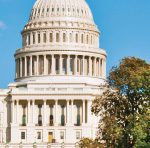Program Description: New laws such as the Dodd-Frank Act have increased the ability of state attorneys general to enforce federal consumer financial provisions. The state attorneys general are also empowered to coordinate with the Consumer Financial Protection Bureau (CFPB). What remains to be seen is if this action will remain unique, or if a number … Continue reading “The Role of State Attorneys General in Enforcing Federal Law”
Program Description: Please join us for a discussion on the United States civil justice system focusing on several key lessons for the legal reform movement. This event includes a discussion of new and emerging trends in litigation, the devastating impact of lawsuit abuse on businesses and on how reformers can win over the public. Lisa … Continue reading “Opportunities for Legal Reform in 2013”
Program Description: In most cases, Medicare is the primary payer for medical services for those covered under the program; however, in special circumstances, such as accidents and job-related injuries, Medicare may be billed first but the expenses are ultimately the responsibility of a third party. According to many, the process for reimbursement of these claims … Continue reading “Medicare Secondary Payer”
Program Description: The Food and Drug Administration (FDA) implements a rigorous review process to determine whether drugs and medical devices are sufficiently safe and effective to be sold to consumers. In some cases, the FDA relies on Advisory Committees made up of external experts to help make approval decisions with respect to drugs that may require … Continue reading “The FDA Advisory Committee Selection Process: Do Financial Conflicts of Interest Affect Outcomes?”
Program Description: Last month the White House announced a new initiative to combat so-called “patent trolls.” Quoting the President as saying they “are just trying to essentially leverage and hijack somebody else’s idea and see if they can extort some money,” they estimate the direct cost of patent trolls were $29 billion in 2011. However, some … Continue reading “Patent Trolls: Greasing the Wheels or Grinding the Gears?”
The Supreme Court will hear a number of cases this Term in the civil justice arena that will likely have far-reaching effects. Notable questions include: whether an arbitrator or a court decides whether a precondition has been satisfied in a multistage arbitration agreement; if a parens patriae action by a state Attorney General is considered … Continue reading “SCOTUS Civil Justice: Cases to be heard before the Supreme Court’s October Term 2013”
Program Description: The House Judiciary Committee recently passed the Lawsuit Abuse Reduction Act of 2013, and it awaits action on the floor of the House. Join us for a discussion of attempts to reform Rule 11 and return it to its pre-1993 language, which required federal judges to impose sanctions on attorneys who violate Rule 11’s … Continue reading “Rule 11 Reform”
Program Description: “Sue and Settle” is a practice used by environmental advocacy groups and federal regulators to change policies at federal agencies, ususally the Environmental Protection Agency. Typically, an advocacy group sues the agency for failure to adequately enforce environmental laws, arguing that the agency has a duty under those laws to establish standards or practices … Continue reading “Federal Agency Sue and Settlement Practices”
Program Description: The False Claims Act (FCA) is an important tool for uncovering fraud and abuse against the United States. The FCA not only aids in the recovery of fradulently obtained money, but also seeks to deter future fradulent acts an encourage ethical behavior. Also known as the Lincoln Law,” the FCA was passed during the … Continue reading “False Claims Act Reform”
Program Description: The Food and Drug Administration proposed a rule in early November 2013 that could increase generic drug manufacturers’ exposure to civil liability. In 2011, the United States Supreme Court concluded that it was impossible for generic drug manufacturers to change their labels, thus preempting state law failure-to-warn claims. The proposed rule would change this … Continue reading “The FDA’s Proposed Rule for Generic Drug Liability”

